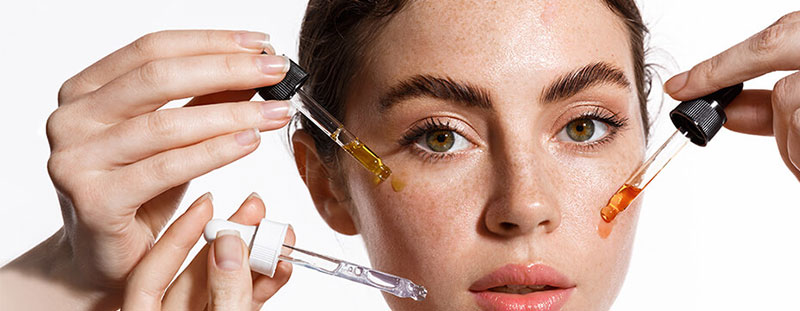
Skincare is an essential part of our daily routine, and we all strive to maintain healthy, glowing skin. With the vast amount of information available on the internet, it can be challenging to know what advice to follow.
Unfortunately, there are many myths about skin care that can mislead people and even harm their skin.
One of the most common myths about skin care is that you don't need to wear sunscreen on cloudy days. Many people believe that since the sun isn't shining, they won't be exposed to harmful UV rays.
However, this couldn't be further from the truth. UV rays can penetrate clouds and cause damage to your skin, even on overcast days. In fact, up to 80% of the sun's UV rays can pass through clouds, according to the Skin Cancer Foundation.
Failing to use sunscreen daily can lead to premature ageing, dark spots, and even skin cancer. That's why it's essential to use a broad-spectrum sunscreen with an SPF of at least 30 every day, regardless of the weather.
By following this advice, you can protect your skin and prevent long-term damage.
Another common myth about skin care is that people with oily skin don't need moisturiser. Many people believe that moisturiser will make their skin even oilier, but this is not necessarily true.
In fact, if you have oily skin, skipping moisturiser can cause your skin to produce more oil to compensate for the lack of hydration, making your skin even oilier.
Moisturiser is an essential step in any skincare routine, regardless of your skin type. It helps to keep your skin hydrated, plump, and protected. The key is to choose a lightweight, oil-free moisturiser that won't clog your pores.
Look for products that are specifically formulated for oily or acne-prone skin, and avoid heavy, creamy formulas.
By using a lightweight moisturiser, you can help balance your skin's oil production and prevent breakouts. With the right moisturiser, you can keep your skin healthy and glowing, without the excess oil.
Exfoliation is an essential step in any skincare routine, as it helps to remove dead skin cells and promote cell turnover.
However, many people believe that the more they exfoliate, the better their skin will look. This is a myth that can actually harm your skin.
Over-exfoliating can strip your skin of its natural oils, disrupt your skin's barrier function, and cause redness and irritation.
This can lead to a compromised skin barrier and make your skin more vulnerable to environmental stressors, such as pollution and UV rays.
It's important to find the right balance when it comes to exfoliation. For most skin types, exfoliating once or twice a week is enough. However, if you have sensitive skin, you may need to exfoliate less frequently.
When exfoliating, be gentle and don't scrub your skin too hard. After exfoliating, make sure to follow up with a hydrating moisturiser to keep your skin nourished and protected.
By finding the right exfoliation frequency and using gentle products, you can achieve smooth, radiant skin without causing harm.
In recent years, there has been a trend towards using natural skincare products. While natural ingredients can be beneficial for your skin, the idea that natural products are always better is a myth.
Many natural ingredients can be harsh on the skin and cause irritation, such as essential oils or citrus extracts.
On the other hand, many synthetic ingredients are designed to be gentle on the skin and provide specific benefits. For example, synthetic retinoids are often used to treat acne and reduce the signs of ageing.
It's important to remember that not all natural ingredients are good for your skin, and not all synthetic ingredients are bad.
Instead of focusing on whether a product is natural or synthetic, pay attention to the ingredients and how they work for your skin type.
Look for products that are formulated for your specific skin concerns, whether it's dryness, acne, or ageing.
Check the ingredients list for any potential irritants, and patch test new products before using them all over your face.
As we age, our skin undergoes changes such as thinning, loss of elasticity, and the appearance of fine lines and wrinkles.
Many people believe that skincare products can completely reverse these signs of ageing, but this is not entirely true.
While skincare products can help to improve the appearance of fine lines and wrinkles, they cannot completely reverse the ageing process.
Ageing is a natural part of life, and factors such as genetics, lifestyle, and environmental stressors all contribute to how our skin ages.
However, using the right skincare products can help to slow down the ageing process and improve the overall health of your skin.
Look for products that contain antioxidants, such as vitamin C and E, which can help to protect your skin from free radical damage and prevent the breakdown of collagen.
Remember, skincare is just one part of a healthy lifestyle. To slow down the ageing process, make sure to eat a balanced diet, exercise regularly, and protect your skin from sun damage.
By taking a holistic approach to your health and skincare, you can achieve healthy, youthful-looking skin for years to come.
In conclusion, there are many common myths about skin care that can be misleading and harmful to your skin. It's important to separate fact from fiction and understand what's really beneficial for your skin.
By following a balanced skincare routine, using the right products for your skin type, and living a healthy lifestyle, you can achieve healthy, glowing skin at any age. So don't believe everything you hear – do your own research and make informed decisions about your skincare routine.
Make an Appointment for Skin Care & Hair Treatment
Dermo Care Skin and Hair Care Solutions.
No : 33-25-34b,
Bellapu Sobhanadri Street,
Pushpa Hotel Road,
Suryaraopet, Vijayawada - 520002.